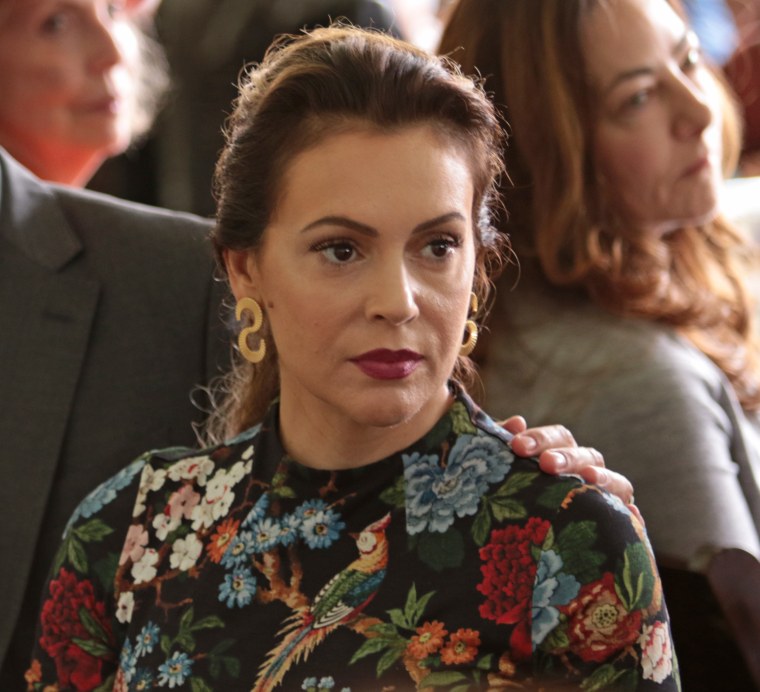The onslaught of headlines about Harvey Weinstein's sexual harassment scandal has struck a nerve across the country, particularly for some survivors of sexual assault.
"I can't look at Facebook without having a flashback," said a 43-year-old Seattle woman who is a survivor of childhood sexual assault. (NBC News doesn't generally identify sexual assault survivors and has respected the wishes of those who didn't want to be named in this article).
She described her social media feed as a "trigger factory."
"I'm glad people are telling their stories, but when they tell that story, what I hear is that there are so many more predators out there than we know," said the woman, who works in the tech industry.
Hearing about others who have survived sexual abuse often brings up memories and challenging emotions for survivors, experts say. Dealing with days' worth of headlines can feel especially overwhelming.
And the #MeToo movement, started years ago by activist Tarana Burke and made popular over the weekend by actor Alyssa Milano — in which people share their experiences to raise awareness about the scope of the problem — has added a personal dimension as survivors see friends and family take to social media.
"For some survivors, 'Me Too' is incredibly empowering and validating, because they realize they're not alone, that this happened to other people, people they wouldn't necessarily expect," said Samantha Manewitz, a licensed social worker and sex therapist in Cambridge, Massachusetts, who specializes in sexual trauma. "For other people, it can be incredibly triggering. I have clients who feel incredibly empowered and others who can't go on their Facebook page without getting panic attacks."
"I have clients who feel incredibly empowered and others who can't go on their Facebook page without getting panic attacks."
For Sarah, a New Yorker in her mid-30s who didn't want her last name published, the numerous friends coming forward has been too much to handle.
"This is crazy. I've been taking walks, just spending less time on my phone and muting group [text] conversations," she said.
Reading the accusations against Weinstein or learning about what friends went through has brought back intense memories of her own past, she said: a family friend who would grope her after church when she was 12; executives she met with when she was trying to break into the fashion industry who tried to kiss her without her permission.
Related: Harvey Weinstein Resigns From His Company Following Scandal, Source Says
A Twitter representative told NBC News that the #MeToo hashtag had been used 880,000 times by Tuesday afternoon. Sarah said she didn't plan to tweet out her story.
"I'm not going to join 'Me Too' because I don't need to give people proof that it happened to me," she said. "I have to unwind, to get off of social media."
Others survivors said they have processed the Weinstein news in ways they didn't expect. For Sashka, a 36-year-old tech entrepreneur who lives in the San Francisco Bay Area, the scandal has brought back the feelings of self-blame she experienced a decade ago after a friend sexually assaulted her in a hotel room.
"'Triggering' can be more than just reading a story and crying. It can be reading a story and feeling your confidence drop off from under you," she said.
But she added that, while reading other people's stories "feels awful," there's some comfort in knowing she isn't alone.
"I think a lot of us are finding that the strength in numbers feels positive," she said.
Those dueling emotions are common, said Laura Palumbo, a certified sexual assault counselor and communications director for the National Sexual Violence Resource Center.
On one hand, Palumbo said, it can be "uplifting" for survivors to see fellow survivors, for the most part, being believed and supported.
Related: Weinstein Lesson: Lot to Lose, Little to Gain by Reporting Sex Harassment
"But the other aspect is that the trauma that you've experienced is now becoming an element of the national conversation, so something that you, as an individual, have experienced that was a really difficult experience is now becoming a feature of everyday conversation," she said.
It's common for survivors of any trauma to feel re-traumatized during and after tragedies. A spokeswoman for RAINN, the nation's largest anti-sexual-violence organization, said the organization had gotten an uptick in calls to its national sexual assault hotline since the Weinstein news broke.
The experts suggested that survivors practice self-care while wading through the headlines.
"Listen to your instincts. It is absolutely OK to step away if you find yourself flooded and overwhelmed," Manewitz said. "There is no wrong way to feel about this. You are not alone, and it is OK to seek help. You don't have to fight this fight alone."

